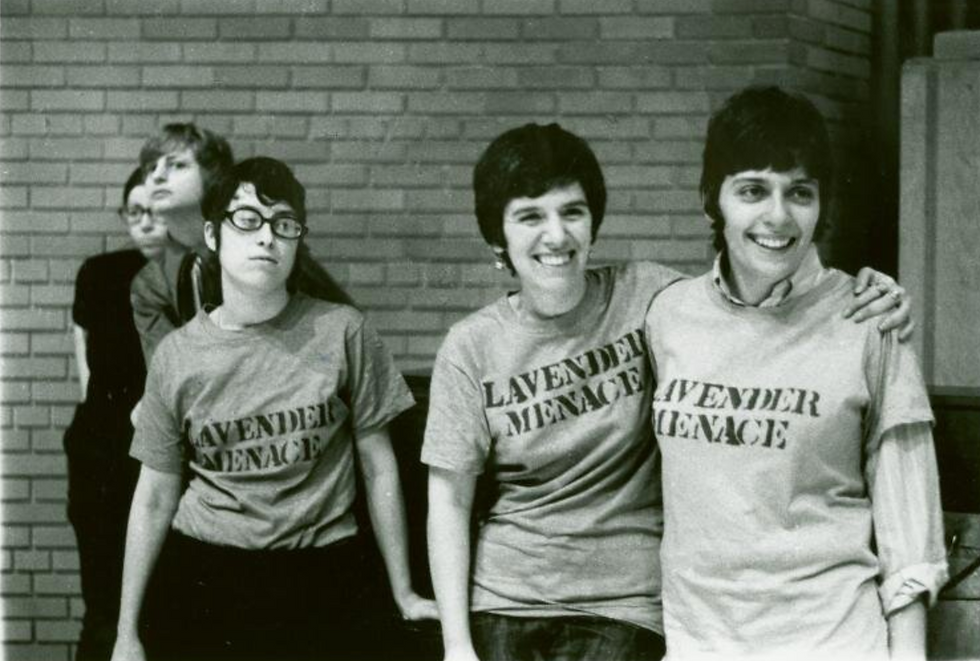ELLEN BROIDY
- The LGBTQ History Project
- Oct 2, 2023
- 3 min read
Updated: Oct 16, 2023
THE GAY LIBERATION FRONT, RADICALESBIANS

Ellen Broidy was born and raised in New York City and came out of the closet when she was a teenager. After that, she never shied away from being at the forefront of the first wave of gay liberation. While studying at New York University, she became the president of the Student Homophile League, which later became NYU Gay Students Liberation. In 1970, as an active member of the New York Gay Liberation Front, she proposed having an annual Pride March at the 1970 Eastern Regional Conference of Homophile Organizations. In May of 1970, Broidy and other members of the Radicalesbians, a short-lived but important group in the history of lesbian and feminist rights, zapped the Second Conference to Unite Women demanding the inclusion of lesbians on their panels. The group’s collectively written manifesto, "The Woman-Identified Woman," defines lesbians as “the rage of all women condensed to the point of explosion” and remains an important snapshot into the power of the greater movement at that time. Broidy went on to receive a Ph.D. in U.S. History from the University of California, Irvine and taught in the women's studies department at the University of California on both the Los Angeles and Irvine campuses.

“I always think of the term Boston Marriage which meant two maiden ladies who lived together. Two women would primary in each other's lives, but nobody would assume they were lesbians because women were not supposed to have any sexuality—they couldn’t possibly be in a sexual relationship. Lesbian relationships were framed as being nothing more than two spinster ladies living together. We didn't cruise and weren't at the trucks or the docks having public sex. Lesbians were not being busted for that because that's not where we carried on any part of our social-sexual life. We went to bars where the mafia was more of a concern, at least in the early days, than the police. Men were more out there, so they had to be louder. If you look at the laws as they're literally written, they’re about men. It was male homosexuality that was illegal because women, frankly, weren't important enough—we weren’t threats.
Lesbians have a sort of double oppression. The word that I'm probably more comfortable with now is intersectionality. I think the women in the Gay Liberation Front understood that slightly differently than the men. Part of it was that there were always more men than women in the group. As we might have tried to have meetings facilitated by a man and a woman, to make things as co-equal as possible, as I said, the men had louder voices. There were more of them because of the social reality of lesbians being in much more private spaces. So, the sexism that came to the forefront had a lot to do with numbers and noise—just how many of them were there and how they could push their agendas to the front of the line. The first couple of charity dances we held were fun to a certain extent. Still, they felt overwhelming to many of the women, leading to, among other things, the first all-women dance. On some level, we suffered the same oppressions: the mafia-run bars and the attack on gender nonconformity. We went our own way when it all broke down and started the Radicalesbians. I would be remiss not to give the development and evolution of the Gay Liberation Front an awful lot of credit for opening up the space for groups like Street Transvestite Action Revolutions or the Radicalesbians to actually exist. In hindsight, we probably all had to come together first and then see how that played out collectively and with some degree of separation. Of course, there was an equally significant separation early on when mostly men broke away to form the Gay Activist Alliance because they felt that the Gay Liberation Front was too intersectional and wasn't focused enough on the one issue of gay liberation. I suppose it went both ways.”





Comments